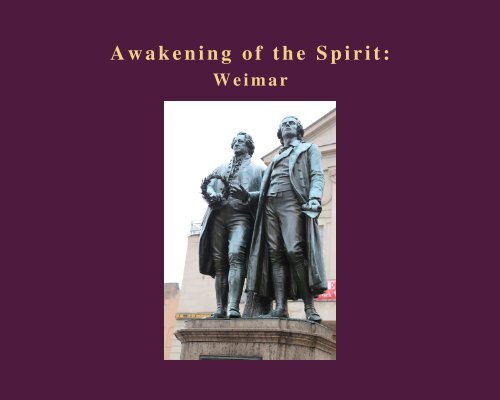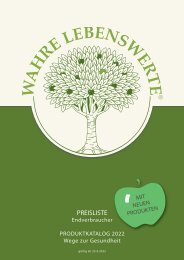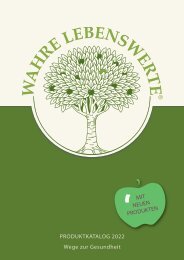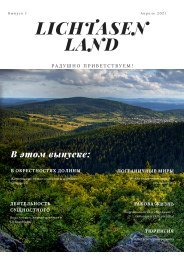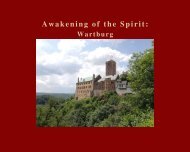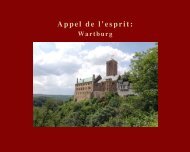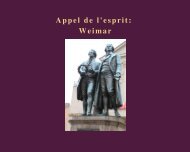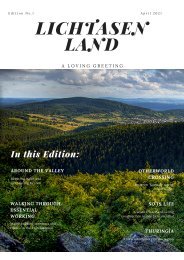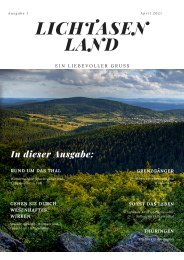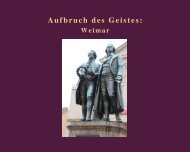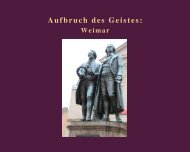Awakening of the Spirit Weimar
Create successful ePaper yourself
Turn your PDF publications into a flip-book with our unique Google optimized e-Paper software.
A w a k e n i n g o f t h e S p i r i t :<br />
W e i m a r
“Be noble, helpful and good.”<br />
That was <strong>the</strong> motto <strong>of</strong> <strong>the</strong> <strong>Weimar</strong> Classicism in <strong>the</strong> late 18th and early<br />
19th centuries.<br />
"The true, <strong>the</strong> beautiful, <strong>the</strong> good” was <strong>the</strong> lodestar in <strong>the</strong> cultural<br />
firmament <strong>of</strong> <strong>the</strong> great minds assembled here, whose effect still radiates<br />
into modern times. The striving after true humanity, <strong>the</strong> longing for <strong>the</strong><br />
realisation <strong>of</strong> highest ideals found expression in <strong>the</strong> works <strong>of</strong> <strong>the</strong>se<br />
writers:<br />
Friedrich Schiller, Johann Wolfgang von Goe<strong>the</strong>,<br />
Johann Gottfried Herder,<br />
Christoph Martin Wieland and many o<strong>the</strong>rs.
In his essay “On Grace and Dignity” Schiller develops <strong>the</strong> concept <strong>of</strong><br />
“moral beauty.”<br />
And in Goe<strong>the</strong>’s Faust <strong>the</strong> choir <strong>of</strong> angels may proclaim:<br />
“Whoever aspires unvariedly is not beyond redemption.”<br />
Goe<strong>the</strong> describes this situation <strong>of</strong> <strong>Weimar</strong> as <strong>the</strong> spiritual and cultural heart <strong>of</strong><br />
Europe thus:<br />
Oh <strong>Weimar</strong>! A special lot fell upon you:<br />
Like Bethlehem in Judea, small and great!<br />
From <strong>the</strong> poem: “On Mieding’s Death”
Various, Die Gartenlaube (1856) b 317, marked as in <strong>the</strong> public domain, details on Wikimedia Commons.<br />
<strong>Weimar</strong> and its poets: Die Gartenlaube (1856)<br />
Caption:<br />
„Einsiedel and Seckendorf. Mrs von Kalb. Von Humboldt bro<strong>the</strong>rs. Schiller. Wieland. Von<br />
Lengefeld sisters. (Mrs von Schiller. Mrs von Wolzogen). Duke Karl August. Goe<strong>the</strong>. Musäus.<br />
Herder. Kotzebue. Kuebel. Duchess Amalie. Duchess Louise.“
The<br />
Ernestiner<br />
family <strong>of</strong><br />
noble<br />
descent
Patron <strong>of</strong> <strong>the</strong> arts<br />
Grand Duke Carl August<br />
<strong>of</strong> Saxony-<strong>Weimar</strong>-Eisenach
Sculpture <strong>of</strong> a lion in front <strong>of</strong><br />
<strong>Weimar</strong> City Palace
Donndorf Fountain in <strong>Weimar</strong>:<br />
Maternal love
“Russischer H<strong>of</strong>” hotel in <strong>Weimar</strong>
“There are moments in a man’s life<br />
When he is closer to <strong>the</strong> spirit <strong>of</strong> <strong>the</strong> world than o<strong>the</strong>rwise.<br />
And has a question free to destiny.”<br />
Schiller, Wallenstein
Goe<strong>the</strong> and Schiller, two <strong>of</strong> <strong>the</strong> most prominent poets in world history, shaped <strong>the</strong><br />
<strong>Weimar</strong> Classicism movement very strongly, from <strong>the</strong> beginning <strong>of</strong> <strong>the</strong>ir<br />
friendship in 1794 until Schiller’s death in 1805.<br />
<strong>Weimar</strong> also blossomed into a city <strong>of</strong> cultural heritage owing to Goe<strong>the</strong>’s<br />
friendship with Duke Carl August.
Johann Christoph Friedrich Schiller
“It is <strong>the</strong><br />
spirit that<br />
builds<br />
its own<br />
body.”<br />
Schiller, Wallenstein
Johann Wolfgang von Goe<strong>the</strong> (1749-1832)
“You can also build beautiful things with stones that have been put<br />
in your path.”<br />
Quotation attributed to Johann Wolfgang von Goe<strong>the</strong>.
Richard Wagner,<br />
<strong>the</strong> visionary and inspired composer,<br />
was connected with <strong>the</strong> city <strong>of</strong> <strong>Weimar</strong> as well.<br />
He had two <strong>of</strong> his operas,<br />
Tannhäuser and Lohengrin,<br />
performed at <strong>the</strong> <strong>Weimar</strong> Court Theatre.
Lohengrin, a romantic opera in three acts, is not only one <strong>of</strong><br />
<strong>the</strong> most significant creations <strong>of</strong> our culture. This work has<br />
also made its impression on <strong>the</strong> city <strong>of</strong> <strong>Weimar</strong>.<br />
When a warrant was issued for Richard Wagner’s arrest<br />
because <strong>of</strong> his involvement in <strong>the</strong> May uprisings in Dresden<br />
in 1849, he had to flee from Germany. His friend and patron<br />
in <strong>Weimar</strong>, Franz Liszt, helped him to obtain false papers,<br />
which enabled him to find refuge in Switzerland.
On 28 August 1850 <strong>the</strong> premiere <strong>of</strong> <strong>the</strong> romantic opera<br />
Lohengrin took place in Wagner’s absence at <strong>the</strong> Court<br />
Theatre in <strong>Weimar</strong> with Franz Liszt as conductor.<br />
And so for <strong>the</strong> first time <strong>the</strong> world heard <strong>the</strong> tender,<br />
unearthly beautiful sounds,which announce <strong>the</strong> arrival<br />
<strong>of</strong> <strong>the</strong> Swan Knight, armoured with truly supernatural<br />
power:
Lohengrin: The Arrival <strong>of</strong> <strong>the</strong> Marvellous<br />
"How handsome and noble he is to behold, brought by such a miracle to our land!"<br />
Lohengrin Act 1, Scene 3
Photo credits:<br />
Page 4:<br />
Various, Die Gartenlaube (1856) b 317, marked as in <strong>the</strong> public<br />
domain, details on Wikimedia Commons.<br />
Page 10:<br />
Royalty-free photo: Canva.com.<br />
With <strong>the</strong> exception <strong>of</strong> <strong>the</strong> pictures according to <strong>the</strong> picture credits and<br />
<strong>the</strong> quotations<br />
photos and text - copyright © 2021 Manfred Peter Luef: www.luef.co.at


